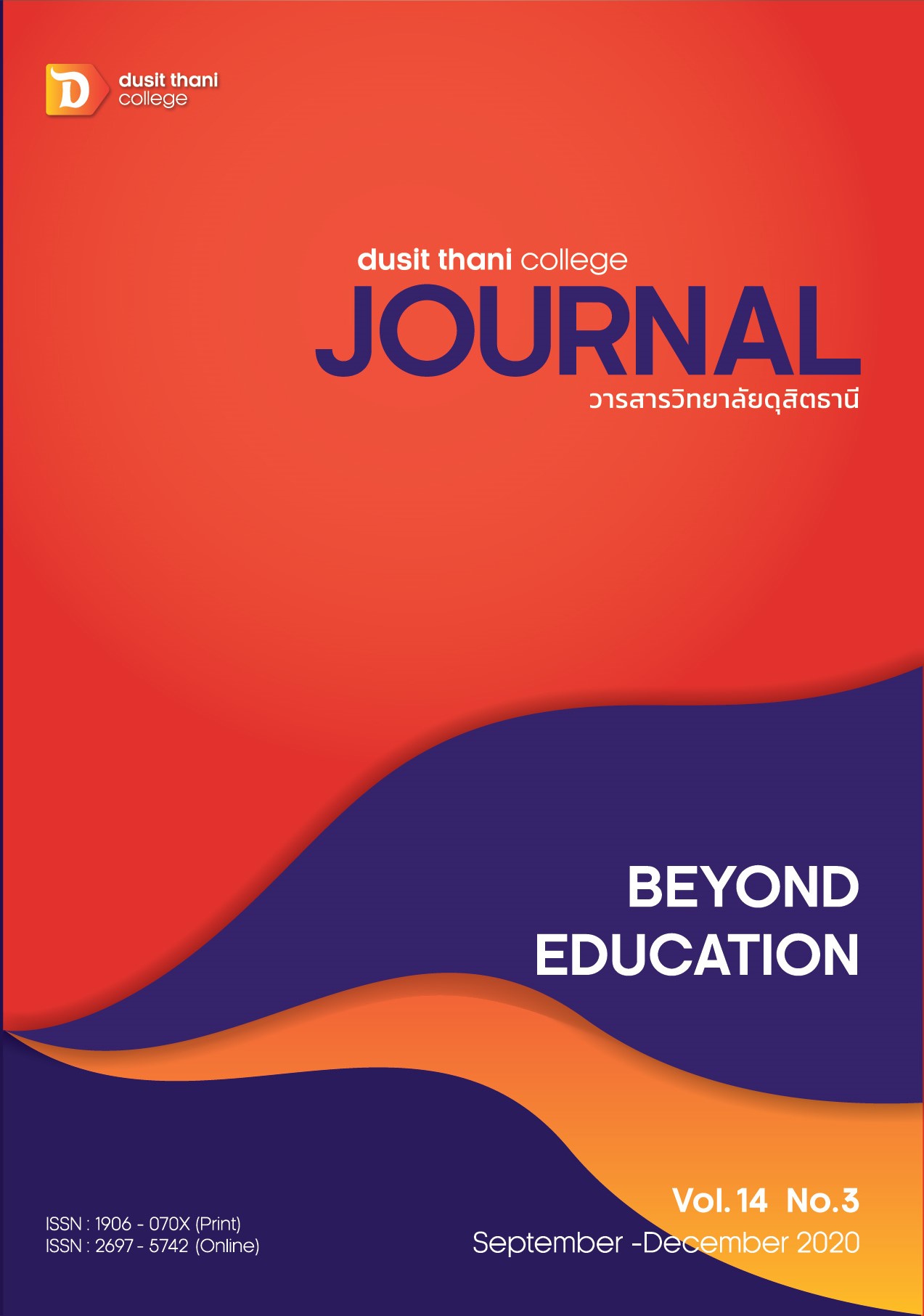ปัจจัยส่วนประสมทางการตลาดในมุมมองของผู้บริโภคและปัจจัยคุณค่าตราสินค้าที่มีผลต่อความจงรักภักดีในตราสินค้าของผู้บริโภคกาแฟแฟรนไชส์ของไทยในกรุงเทพมหานคร
Main Article Content
บทคัดย่อ
การวิจัยครั้งนี้มีวัตถุประสงค์เพื่อ (1) ศึกษาปัจจัยส่วนบุคคล และพฤติกรรมการใช้บริการของผู้บริโภคชาวไทยที่มีผลต่อความจงรักภักดีในตราสินค้ากาแฟแฟรนไชส์ของไทยในกรุงเทพมหานคร (2) ศึกษาปัจจัยส่วนประสมทางการตลาดในมุมมองของผู้บริโภค และปัจจัยคุณค่าตราสินค้าที่มีผลต่อความจงรักภักดีในตราสินค้าของผู้บริโภคกาแฟแฟรนไชส์ของไทยในกรุงเทพมหานคร เป็นการวิจัยเชิงปริมาณ โดยอาศัยแบบสอบถามที่ได้มีการเก็บรวบรวมข้อมูลจากผู้บริโภคชาวไทยที่เคยใช้บริการร้านกาแฟแฟรนไชส์ของไทยในกรุงเทพมหานคร จำนวน 400 คน การสุ่มตัวอย่างร้านกาแฟ ใช้วิธีการสุ่มตัวอย่างแบบง่าย โดยจับฉลากเลือกแบรนด์กาแฟแฟรนไชส์ของไทยจำนวน 4 แบรนด์ และการสุ่มตัวอย่างผู้ใช้บริการ ใช้วิธีการสุ่มตัวอย่างแบบโควต้า โดยเก็บข้อมูลแบรนด์ละ 100 คน สถิติที่ใช้ในการวิเคราะห์ข้อมูล ได้แก่ ค่าแจกแจงความถี่ ค่าร้อยละ ค่าเฉลี่ย และค่าเบี่ยงเบนมาตรฐาน สถิติที่ใช้ในการทดสอบสมมติฐาน ได้แก่ การวิเคราะห์ความแตกต่างด้วย t-test การวิเคราะห์ความแปรปรวนด้วย F-test การวิเคราะห์ความแตกต่างค่าเฉลี่ยรายคู่ด้วยวิธี LSD และการวิเคราะห์การถดถอยเชิงพหุ
ผลการวิจัยพบว่า ผู้ตอบแบบสอบถามส่วนใหญ่เป็นเพศหญิง มีช่วงอายุอยู่ใน Generation Y มีสถานภาพโสด มีการศึกษาในระดับปริญญาตรี มีอาชีพเป็นพนักงานเอกชน และมีรายได้เฉลี่ยต่อเดือน 30,001 – 40,000 บาท มีความถี่ในการใช้บริการร้านกาแฟแฟรนไชส์ 2-3 ครั้ง / สัปดาห์ ใช้บริการร้านกาแฟแฟรนไชส์ในช่วงเวลา 06:00 – 09:00 น. มีค่าใช้จ่ายเฉลี่ยต่อครั้งในการใช้บริการร้านกาแฟแฟรนไชส์ 51-70 บาท มีเหตุผลในการใช้บริการร้านกาแฟแฟรนไชส์ด้านรสชาติของผลิตภัณฑ์ นอกจากนั้น ในภาพรวม ปัจจัยส่วนประสมทางการตลาดในมุมมองของผู้บริโภค และปัจจัยคุณค่าตราสินค้า ส่งผลต่อความจงรักภักดีอยู่ในระดับมาก โดยผลการทดสอบสมมติฐาน ด้วยการวิเคราะห์ความแตกต่างด้วย t-test การวิเคราะห์ความแปรปรวนด้วย F-test พบว่า ระดับการศึกษา และรายได้เฉลี่ยต่อเดือนที่แตกต่างกัน มีผลต่อความจงรักภักดีในตราสินค้าของผู้บริโภค รวมทั้ง ความถี่ในการใช้บริการ ค่าใช้จ่ายในการใช้บริการ และเหตุผลในการใช้บริการที่แตกต่างกัน มีผลต่อความจงรักภักดีในตราสินค้าของผู้บริโภค และผลการทดสอบสมมติฐาน ด้วยการวิเคราะหการถดถอยเชิงพหุ โดยใชเทคนิควิธีนําเขา (Enter) ในภาพรวม พบว่า ปจจัยที่สงผลตอความจงรักภักดีในตราสินคาของผูบริโภคกาแฟแฟรนไชส์ของไทยในกรุงเทพมหานคร ทั้งปจจัยสวนประสมทางการตลาดในมุมมองของผูบริโภค และปจจัยคุณคาตราสินคา รวมกันมีความสัมพันธทางบวกกับความจงรักภักดีในตราสินคาของผูบริโภคกาแฟแฟรนไชส์ของไทยในกรุงเทพมหานคร และสามารถรวมกันทํานายความจงรักภักดีในตราสินคาของผูบริโภคกาแฟแฟรนไชส์ของไทยในกรุงเทพมหานคร ไดถึงรอยละ 45.6 (R² = .456) จากผลการวิจัย ผู้ประกอบควรให้ความสำคัญกับส่วนประสมทางการตลาดบริการในทุก ๆ ด้าน เนื่องจากประสบการณ์ที่ดีจากการรับบริการ จะช่วยสร้างทัศนคติที่ดีต่อตราสินค้า และส่งผลให้เกิดความจงรักภักดีในตราสินค้า และเกิดการซื้อซ้ำ
Article Details
นโยบายการพิจารณากลั่นกรองบทความ
- บทความวิจัยและบทความวิชาการทุกเรื่องที่จะได้รับการตีพิมพ์ต้องผ่านการพิจารณากลั่นกรองโดยผู้ทรงคุณวุฒิ (Peer Review) ในสาขาที่เกี่ยวข้อง จำนวน 3 ท่าน/บทความ
- บทความ ข้อความ ภาพประกอบและตารางประกอบที่ลงตีพิมพ์ในวารสารเป็นความคิดเห็นส่วนตัวของผู้เขียน กองบรรณาธิการไม่จำเป็นต้องเห็นด้วยเสมอไป และไม่มีส่วนรับผิดชอบใด ๆ ถือเป็นความรับผิดชอบของผู้เขียนแต่เพียงผู้เดียว
- บทความที่จะได้รับการตีพิมพ์จะต้องไม่เคยตีพิมพ์ เผยแพร่ที่ใดมาก่อน และไม่อยู่ระหว่างการพิจารณาของวารสารฉบับอื่น หากตรวจสอบพบว่ามีการตีพิมพ์ซ้ำซ้อน ถือเป็นความรับผิดชอบของผู้เขียนแต่เพียงผู้เดียว
- บทความใดที่ผู้อ่านเห็นว่าได้มีการลอกเลียนหรือแอบอ้างโดยปราศจากการอ้างอิง หรือทำให้เข้าใจผิดว่าเป็นผลงานของผู้เขียน กรุณาแจ้งให้กองบรรณาธิการวารสารทราบจะเป็นพระคุณยิ่ง
เอกสารอ้างอิง
Aekwit Suwonnawong. (2012). Trend of broadband internet after 3G technology in Muang District, Nakhon Ratchasima. Master of Engineering Project, Civil Engineering Program Faculty of Engineering Suranaree University of Technology.
Atikit Sinturahat. (2018). Marketing mix factors of coffee shop affecting customer loyalty in Hatyai Songkhla. Independent Study, Master of Business Administration, Faculty of Business Services Ramkhamhaeng University.
Chaisomphon Chaoprasert. (2003). Service marketing. Bangkok: Se-Education.
Cochran, W.G. (1953). Sampling Techniques. New York: John Wiley and Sons.
Food Intelligence Center. (2018). A "coffee shop" war in a gas station to a coffee chain outside the gas station. Retrieved September 21, 2019 from https://positioningmag.com/1180713.
Food Intelligence Center. (2019). Coffee shop business in Thailand. Retrieved September 23, 2019 from http://fic.nfi.or.th/MarketOverviewDomesticDetail.php?id=207.
Helander, M. G. and Khalid, H. M. (2000). Modeling the customer in electronic commerce. Applied ergonomics, 31(6), 609-619.
Jacoby and Chestnut. (1978). Brand Loyalty: Measurement and Management. New York: John Wiley and Sons.
Kapferer, J. N. (2010). The New Strategic Brand Management: Creating and Sustaining Brand Equity Long Term. 4nd edition. London: Kogan Page.
Kasikorn research center. (2018). How does the coffee shop business manage to flourish? Retrieved September 23, 2019 from https://kasikornbank.com/th/business/sme/KSMEKnowledge/article/KSMEAnalysis/Documents/Coffee-Shop-Management.pdf
Montri Sriwong. (2019). Thai Franchise Business Market Overview 2019-2020.
Retrieved December 6, 2019 from http://www.thaismescenter.com/ส่อง-ภาพรวมตลาดธุรกิจแฟรนไชส์ในไทย-ปี-2562-2563/
Montri Sriwong. (2019). why? Fresh coffee franchises all over the world are booming. Retrieved September 14, 2019 from http://www.thaismescenter.com/ทำไม-แฟรนไชส์กาแฟสดทั่วโลกถึงเฟื่องฟู.
Nuttanon Chokratsamesiri. (2015). Marketing mix factors relating to the loyalty of consumers for budget hotel in Muang District Nakhon Phathom Province. Master of Business Administration Thesis, Silpakorn University.
Office of Small and Medium Enterprise Promotion. (2019). Catch the hottest business "coffee" Any era has never been out. Retrieved September 21, 2019 from https://www.smeone.info/event-detail/5579.
Palley, W. (2012). GEN Z: Digital in their DNA. New York: JWT Intelligence.
Pawinee Nitiwetyangkul. (2017). Factors influencing brand loyalty and referrals to Starbucks Coffee customers in Bangkok. Master of Business Administration, Marketing Program, Faculty of Business Administration Dhurakij Pundit University.
Pradit Choompolsathien. (2014). Branding and marketing communication. 8th edition. Bangkok: Advanced Research Group.
Sarathiwat Thanapairin. (2016). Service marketing mix and the customer perspectives influencing purchasing decisions on brewed coffee at Café Amazon at gasoline stations in Bangkok metropolitan area. Master of Business Administration, Graduate School of Marketing, Srinakharinwirot University.
Sarun purapha and Suphada Sirikudta. (2013). Brand Equity and Satisfaction toward marketing mix and buying behavior affecting consumer buying behavior trend on Singha beer in Bangkok Metropolis. Srinakharinwirot Business Administration Journal, 4(1),79-95.
Schiffman, L. and Wisenblit, J. (2015). Consumer Behavior. New York: Prentice-Hall.
Segoro, W. (2013). The influence of perceived service quality, mooring factor, and relationship quality on customer satisfaction and loyalty. Journal of Social and Behavioral Sciences, 81, 306–310.
Seri Wongmonta. (1999). Consumer Behavior Analysis. Bangkok: Prakaipruek Press.
Sirinapha Phimarin. (2014). Service marketing mix relating to consumer buying decision on fresh coffee at true coffee Patra complex branch in Ratchadaphisek road. Master of Business Administration, Srinakharinwirot University.
Sudarak Wongcharoen. (2013). Brand Equity affects the Loyalty Retention of Blackmore Supplements. Independent Study, Master of Business Administration, Faculty of Business Administration Bangkok University.
Supatcha Wittayakong. (2016). Factors influencing customer brand loyalty to low-cost airlines in Thailand. Independent Study, Master of Business Administration, Faculty of Commerce and Accountancy Thammasat University.
Supon Phrommaphan. (2011). New breed: Generation Net. Retrieved June 5, 2020 from http://www.ryt9.com/s/tpd/1067502
Van Den Bergh, J. and Behrer, M. (2011). How cool brands stay hot: Branding to generation Y. London, England: Kagan Page.
Virasak Sutanthavibul. (2018). Gen Y Behavioral Penetration. Retrieved December 5, 2019 from https://www.prachachat.net/finance/news-211619


